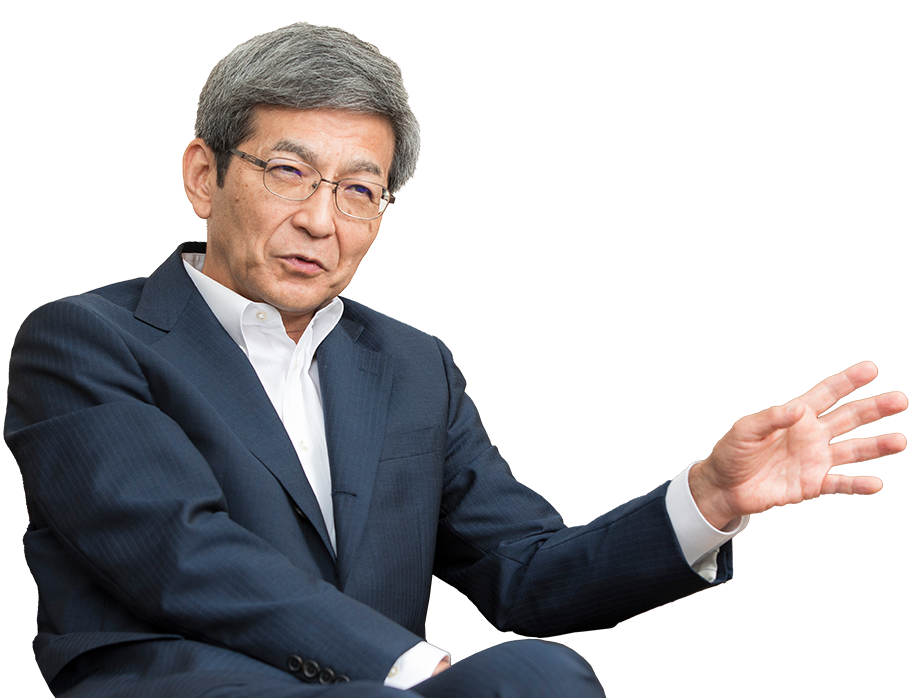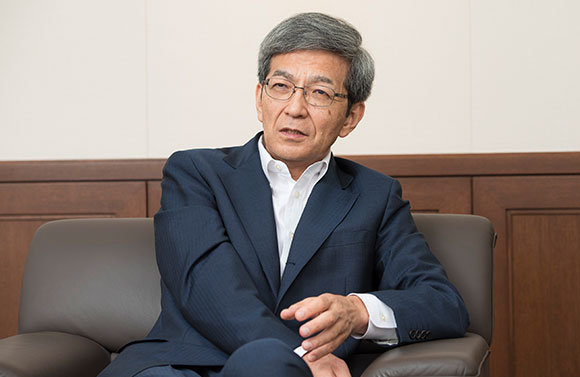Interview with an Outside Director (2022)
Since Mr. Hiroshi Oeda was appointed as an Outside Director in June 2018, he has been providing advice with respect to the business management of the Company at Board of Directors meetings and supervising business execution appropriately by leveraging his abundant experience and skill regarding global corporate management, business strategies, execution of overseas M&A, etc., gained from serving as a management executive of the largest milling company in Japan.
First, what is your role as an Outside Director as you see it?
In general, outside directors are expected to supervise the execution of business from an independent and objective standpoint. Within this broad mandate, I consider the creation of an environment in which executives can adopt risks while still engaging in business activities in a sound manner to be of paramount importance. Earlier in my career, I served as president and chairman of the board of a food company for six years. Drawing from my experience during this period, I believe that the difference between an outside director and an executive president is objectivity. During my tenure as president, I placed considerable emphasis on the need to remain competitive whenever decisions were made under extremely stressful conditions. As part of this decision-making process, I clearly recall that outside directors offered their calm and objective advice from a broad perspective while adopting a supportive stance.
Four years have now passed since I assumed the position of Outside Director at SEKISUI CHEMICAL Group. During this period, the Company has engaged in sound management as it vigorously pursued business while prudently adopting risks. Risks are inherent in any and all business decisions. I am therefore mindful of the need to respect both the decisions made by executives and the review and monitoring process. As serious risks arise, I encourage the Company to take the necessary steps to implement countermeasures from a calm and objective perspective.
How do you evaluate the effectiveness of the Company’s governance function?
At the time of my appointment as Outside Director, Mr. Koge served concurrently as SEKISUI CHEMICAL Group president and Chair of the Board of Directors. Two years ago, Mr. Kato replaced Mr. Koge as president. Mr. Koge then became non-executive Chairman and Chair of the Board of Directors. Currently, the Board of Directors consists of six executive and six non-executive members. The fact that the Board of Directors is chaired by a non-executive is also indicative of effective governance through the separation of executive and oversight functions. Outside Directors are provided with detailed explanations of agenda items prior to Board of Directors’ meetings. Armed with an understanding of the content of agenda items, Outside Directors are well positioned to offer their opinions in a lively manner. I am therefore confident that deliberations by the Board of Directors are of a high quality.
The chairperson is also highly skilled at organizing Board of Directors’ meetings, listening carefully to opinions, summarizing discussions, and, when necessary, commenting on issues to be addressed in the future. Taking into consideration these factors, I rate the effectiveness of the Company’s governance function as very high.
As far as diversity is concerned, three new female Outside Directors joined the Board in June 2022. Five of the Company’s Outside Directors have corporate management experience. Despite this common experience in the corporate sector, their careers and strengths differ. As such, I am confident that discussions will be further invigorated by the diversity of perspectives. I believe that the Board of Directors is distinguished by its high degree of diversity. This includes the skill sets of Audit and Supervisory Board members. With the growth of our overseas business, I hope that SEKISUI CHEMICAL Group will appoint Directors from diverse nationalities.
What do you see as SEKISUI CHEMICAL Group’s strengths?
Each of the Company’s existing segments including the Housing, UIEP, and HPP Companies as well as the Medical Business, have strengths in their respective industries and continue to grow steadily. One of SEKISUI CHEMICAL Group’s major strengths is its portfolio. Leveraging its unique Unit Construction Method, the Housing Company continues to expand its share in the housing market. The high value-added interlayer films manufactured by the HPP Company are also highly regarded across the world. In addition, the Medical Business has evolved to the stage where it could readily become a fourth divisional company through M&As and other means. This will inevitably help further bolster the portfolio. I am also looking forward to the full-scale commercialization of the new biorefinery and other businesses that contribute to solving global environmental issues.
Another strength is the Group’s abundant human resources and corporate culture of developing people. This corporate culture that places the utmost importance on developing human resources is evident in the Board of Directors as well as the dialogue between employees, which is a mixture of severity and warmth, that can be seen during visits to business sites. Many of the Group’s employees are both earnest and courteous. Successful efforts have been made to develop a sufficient number of executive candidates, who are recognized as important assets.
What are your thoughts on the challenges to be faced from a governance perspective,
and in which areas do you see room for improvement?
SEKISUI CHEMICAL Group comprises business sector divisional companies and the Corporate Headquarters that serves an organizational function. My impression is that divisional companies are afforded significant authority while the Corporate Headquarters provides support. Certain companies maintain governance systems where the Corporate Headquarters exercises its authority over the entire company. I cannot say which is better. As the Group’s overseas business continues to expand, steps must be taken to manage the subsequent risks from a compliance perspective. With this in mind, it might be prudent to consider an organizational structure in which the Corporate Headquarters exhibits greater oversight over the Group as a whole.
SEKISUI CHEMICAL Group’s Long-term Vision and Medium-term Management Plan were formulated by the president and management team in their own words and as such is easy to understand. At the same time, positive steps continue to be made in the separation of the executive and supervisory functions. In categorizing challenges into short-term as well as medium- and long-term issues going forward, I believe it would be better for the Board of Directors to spend more time deliberating on and increasing their involvement in setting the direction and framework for medium- and long-term issues.
Drawing on your extensive experience in M&As as well as global business,
what are your recommendations for expanding the Group’s overseas business?
As far as the Group’s overseas business is concerned, rather than the organic growth of existing businesses, I believe the execution of M&As is vital in achieving the net sales target of ¥2 trillion and operating profit ratio target of 10% or higher identified under the Long-term Vision, Vision 2030. SEKISUI CHEMICAL Group entered the aircraft sector in earnest with the acquisition of U.S.-based AIM Aerospace Corporation, a leading aircraft components company, at a record-high acquisition price in 2019. Shortly thereafter, the airline industry was severely impacted by COVID-19 with the Group incurring an impairment loss in the previous fiscal year as a result. From a long-term perspective, however, I believe that this acquisition, which allowed the Group to enter the aircraft industry, was the right business decision for future growth. I hope that SEKISUI CHEMICAL Group will continue to expand its business with confidence as it proactively pursues M&As.


